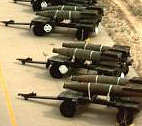 . . . is to gag your opponent. And that’s exactly how the prosecution is trying to win the public domain argument in the Chi Mak trial, which we’ve discussed here and here.
. . . is to gag your opponent. And that’s exactly how the prosecution is trying to win the public domain argument in the Chi Mak trial, which we’ve discussed here and here.
At least two of the three documents that Mak is charged with exporting in violation of the Arms Export Control Act were clearly public domain. They were co-authored by Mak and presented at seminars which were conducted by the American Society of Naval Engineers and which were open to the public. Accordingly, under section 120.11(a)(6) of the ITAR, these papers were public domain information and not export-restricted technical data.
The prosecution’s approach to this argument was to ask the trial court through a Motion in Limine to forbid Mak from introducing any evidence that these papers were presented at public conferences, which is rather like trying to suppress evidence that the victim is still alive at a murder trial.
The government’s basis for this outrageous claim is, well, outrageous. The government asserts that DDTC has certified that the two papers were technical data within the rule and then claims that this certification is immune from any judicial review.
The basis for this argument is § 2278(h) of the Arms Export Control Act, which states
The designation by [DDTC], in regulations issued under this section, of items as defense articles or defense services for purposes of this section shall not be subject to judicial review.
So, did DDTC issue regulations designating these documents as technical data? Of course not. So how could this provision apply at all?
The government tries to get around this problem by citing Karn v. United States Dep’t of State, 925 F. Supp 1 (D.D.C. 1996). That case did indeed hold that a DDTC determination that a particular diskette was a defense article was not subject to review. But the government doesn’t tell the whole story of why the Karn court held that this determination was unreviewable. The court made that determination because the determination was made by DDTC pursuant to the specific procedures for a commodity jurisdiction request set forth in section 120.4 of the ITAR:
It is far more reasonable to read [the Arms Export Control Act] to preclude judicial review for the designation of items as defense articles pursuant to the language of the munitions list and the procedures provided for interpreting the list, all set forth in the ITAR–in other words, if the defendants follow the procedures set forth in the ITAR and authorized by the AECA for designating an item as a defense article, such item is a part of the munitions list.
I’ve seen these certifications from DDTC in other criminal export cases but, dollars to doughnuts, the DDTC has not made a formal commodity jurisdiction determination under the procedures set forth in section 120.4 Instead, it is likely that it simply responded to an informal request from the prosecution with a letter or affidavit. Nothing, not one word, in Karn suggests that such an informal response from the DDTC is immune from judicial review.
Even if the informal determination is unreviewable, it is only unreviewable as to what the DDTC actually determined. Clearly the DDTC would have determined that the papers related to a defense article on the USML. If the papers also had possible non-military applications, the DDTC would have determined in addition that the papers primarily related to the defense article.
But did the DDTC determine that the papers were in the public domain? Of course not. How could it? How could the DDTC determine that the documents had never been released to the public? At most, the DDTC determination, even if you buy the government’s non-reviewability argument, forecloses the defendants from litigating whether the papers predominantly relate to defense articles.
 A short round-up of current export items that don’t merit their own posts:
A short round-up of current export items that don’t merit their own posts:
 Posted by
Posted by  Category:
Category: 

 . . . is to gag your opponent. And that’s exactly how the prosecution is trying to win the public domain argument in the Chi Mak trial, which we’ve discussed
. . . is to gag your opponent. And that’s exactly how the prosecution is trying to win the public domain argument in the Chi Mak trial, which we’ve discussed  Yesterday we
Yesterday we  The trial of Chi Mak and other members of his family for export of ITAR-controlled technical data begins this week. An
The trial of Chi Mak and other members of his family for export of ITAR-controlled technical data begins this week. An  According to one
According to one 

